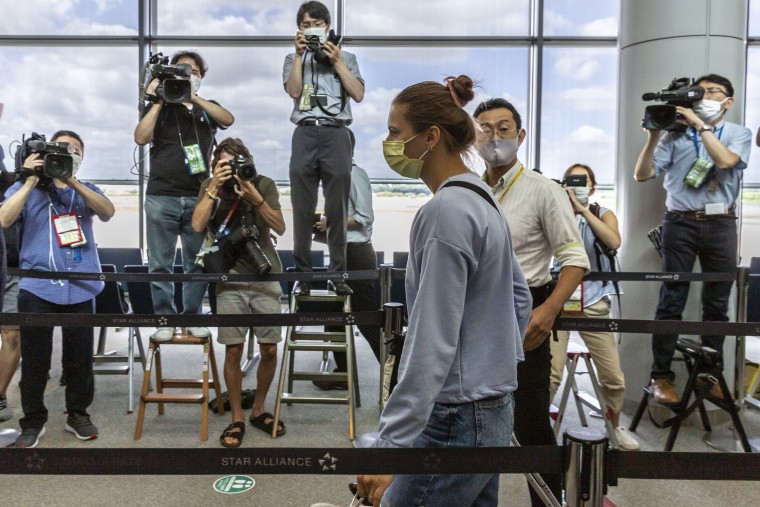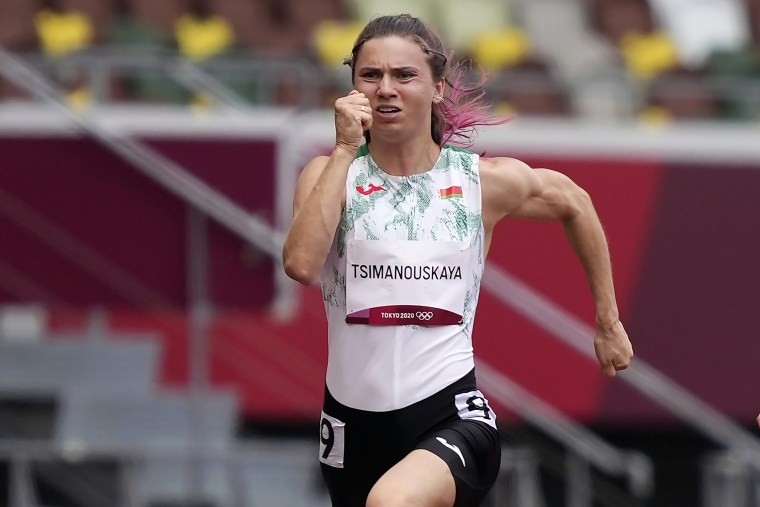LONDON — For the man known as Europe’s last dictator, this is personal.
When Belarusian Olympic sprinter Krystsina Tsimanouskaya, 24, criticized her country’s sporting officials this week for entering her in an unfamiliar race, she said she was told to return home immediately and face the consequences of questioning the wishes of President Alexander Lukashenko's regime.
She left Tokyo on a flight bound for Austria early Wednesday after spending two nights in the Polish embassy in Tokyo. She is expected to head to Poland, which offered her a humanitarian visa on Monday.
Download the NBC News app for breaking news and politics
Experts say that the sports-loving Lukashenko, whose son runs the national Olympic committee and who inherited the role from his father, could not allow the sprinter’s criticism to go unpunished.
Lukashenko “is really very sensitive in terms of sports and even more so when there’s criticism — he likes to act as if he is a sports man, in such good physical shape, who takes care of sports people,” said Veronica Laputska, co-founder of the Eurasian States in Transition Research Center, a think tank based in Warsaw. “There’s a personal element here. It will have irritated him.”
This is the latest sign of what Belarus-watchers say is the nervous insecurity of a leader who has ruled with authoritarian zeal for 27 years but fears time may be running out.

The episode began when Tsimanouskaya said on Instagram over the weekend that she was told to run in the 4x400-meter relay because other Belarusian athletes had not taken the required number of doping tests.
For this she and her husband, Arseni Zdanevich, who has fled from Belarus to Ukraine, The Associated Press reported, must now start a new life in a new country.
When boarding her flight she was wearing sunglasses bearing the message “I RUN CLEAN,” Reuters reported.
In an interview with the AP on Tuesday night, Tsimanouskaya said officials "made it clear that, upon return home, I would definitely face some form of punishment. There were also thinly disguised hints that more would await me."
Tsimanouskaya fled Tokyo almost one year after Lukashenko claimed victory in a disputed election, sparking a protest movement against his rule.
Tens of thousands joined marches calling for him to step down and hand over power to opposition leader Sviatlana Tsikhanouskaya, who fled to neighboring Lithuania and has in the past week met with both President Joe Biden and British Prime Minister Boris Johnson.
Lukashenko rode out the protest movement — thousands were arrested and many remain in jail — but observers say it has left him more belligerent and sensitive to criticism.

The intended audience for the action against Tsimanouskaya was very much ordinary Belarusians, according to Elena Korosteleva, a professor of international politics at the University of Kent in England.
“You can see how they blew this out of proportion — just a brief criticism by a sprinter of the Belarusian bureaucracy suddenly turned into an international scandal. It’s another demonstration of power,” she said.
“What Lukashenko aims for is ‘project fear,’ to show that even at these Games in Japan he can still reach out and punish all those who disagree or who dare to criticize.”
A murder investigation is underway in Kyiv, Ukraine, after a prominent Belarusian who helped compatriots flee persecution was found hanged in a park.
Belarus made headlines in May when a flight taking 26-year-old Belarusian journalist and activist Roman Protasevich from Greece to Lithuania was intercepted by fighter jets and rerouted to Minsk, the Belarusian capital, under the pretense of a false bomb threat.
Protasevich was arrested and later confessed to plotting to bring down the president in a TV interview. Opposition figures said he was coerced into taking part in a propaganda exercise.
And on Friday Lukashenko told state-run Belta TV that he was prepared to mobilize 500,000 troops to defend his borders against an unspecified enemy, with the backing of Russian forces if necessary.
The events of the last week show how the Lukashenko regime, short on international friends and with simmering resentment at home, is doing all it can to secure power, experts say.
Lukashenko "feels very vulnerable at the moment because he knows he’s very dependent on Russia, which seems to be the only protector of Belarus at the moment,” Korosteleva said. “He knows he remains very vulnerable against his own people, and of course against the international community.”
Though Lukashenko has said he will step down once the country adopts a new Constitution, experts say there is little chance of this happening soon. Meanwhile, the simmering resentment of Belarusians who feel he stole the 2020 election appears to be quietly growing stronger.
“Lukashenko succeeded in thwarting all the street protests directly, but the indirect resistance continues and it survives in all kinds of digital means, through social media,” Korosteleva said. “That means that one way or another, if not today, Lukashenko’s regime is definitely coming to an end.”
